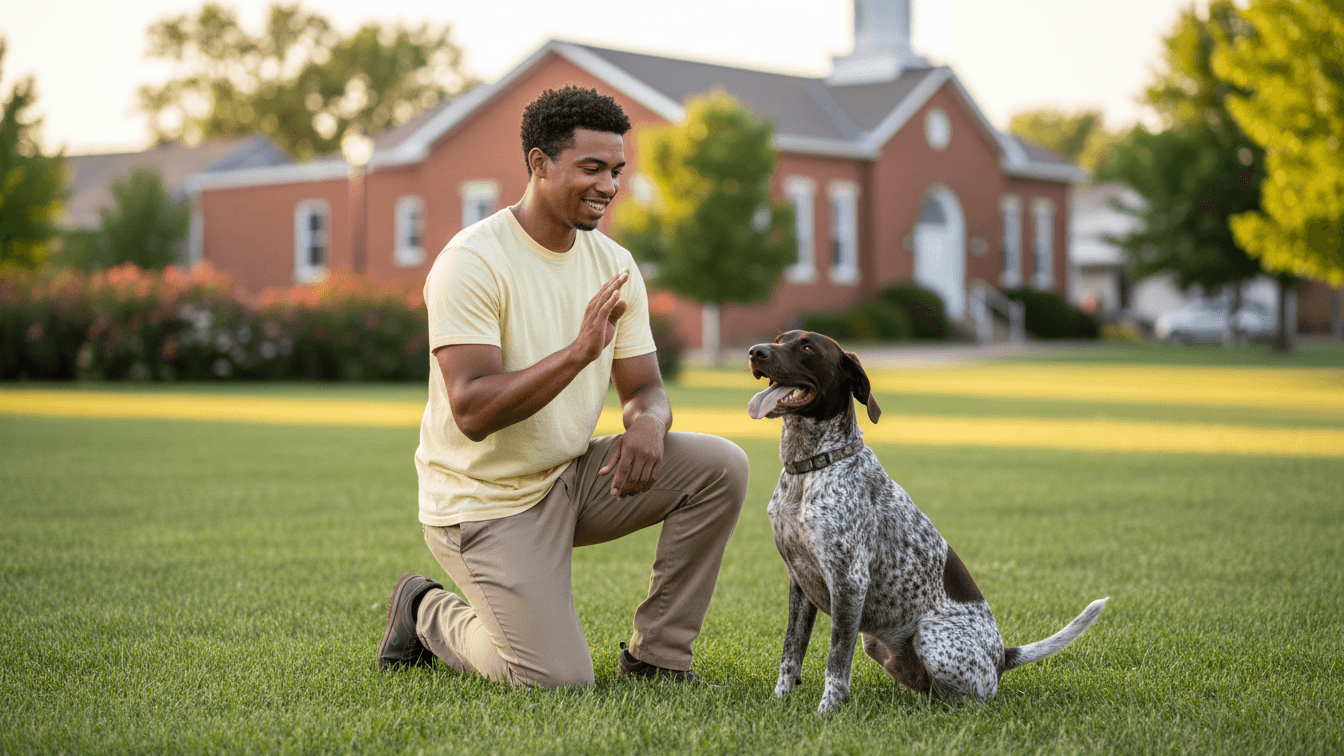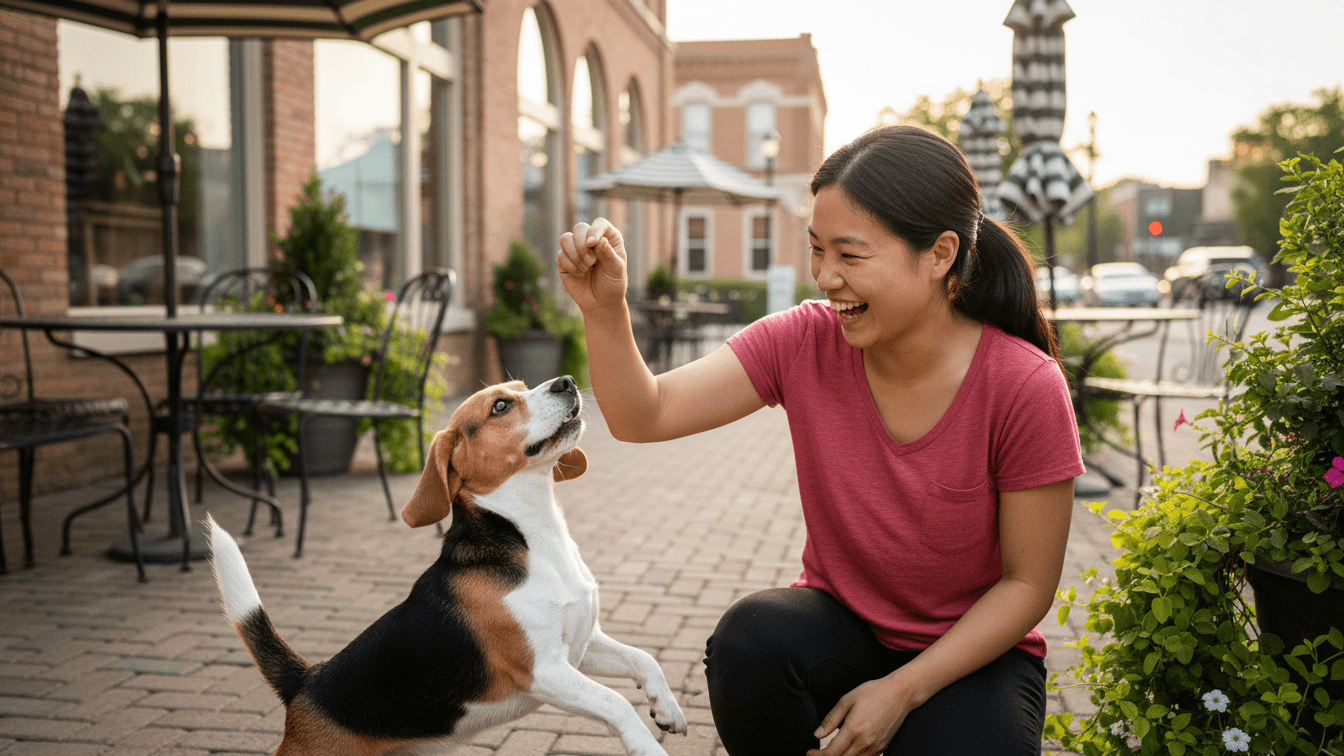Your Complete Guide to Choosing a Dog Trainer in Clay Center and Surrounding Areas
Living with a dog in Clay Center means navigating a close-knit community where your dog might join you for errands on Court Street, walks through quiet neighborhoods, or visits to local businesses. Your dog needs to handle these everyday situations calmly, from polite greetings at the Clay County Courthouse lawn to staying focused during the annual Clay County Fair.
Clay Center sits in Clay County, so you’ll follow county and state regulations for dog ownership. When you find a trainer who understands these local details, you’ll get better results both at home and around town.
How to Choose the Right Trainer
Start by looking for someone who uses positive reinforcement training and can set realistic goals for your Clay Center lifestyle. This means your dog should learn to walk calmly through downtown, stay polite around livestock at the fairgrounds, and handle trips to the vet without drama.
Credentials give you a quick way to compare trainers’ experience levels. Common dog trainer certifications include KPA-CTP, CPDT-KA, or IAABC-CDBC for behavior problems. If your dog has serious aggression issues, look for someone with CBCC-KA or a science-based program like CTC.
In-home dog training works great for puppy training basics, door manners, and neighborhood leash skills. Group classes make sense once your dog can focus around other dogs, especially before you try busier spots like community events or Clay Center Days.
Common Dog Training Methods Explained

Reward-based methods build the trust you want while creating lasting behavior changes. They also help you follow Clay Center’s rules about keeping dogs under control in public spaces.
Basic obedience covers sit, down, stay, place, recall, and leash training so your dog can handle walks, outdoor events, and visits to friends without pulling or jumping on people. These dog training services form the foundation for everything else.
Puppy classes focus on socialization, potty training, bite control, crate comfort, and early leash manners. Starting with short, positive training sessions prevents bad habits from forming in the first place.
Behavior modification addresses fear, reactivity, resource guarding, or separation anxiety through careful desensitization and counterconditioning. For serious cases, ask if your trainer works with local veterinarians.
Private lessons let you customize everything around your daily routines, while board and train can speed up results when you’re short on time. Both approaches can help your dog become a well-behaved dog with consistent practice.
Dog training classes help your dog practice good manners around other dogs and people. The best classes give dogs plenty of space, screen participants carefully, and teach calm behavior rather than just excitement.
Specialized training like therapy dog training or service dog training requires extra structure, public-access skills, and a very clear step-by-step program. Expert dog trainers can help you understand what these paths require.
Stay away from trainers who use fear, intimidation, or pain to get results. Humane methods are safer for everyone, easier to maintain long-term, and much better for keeping peace with your neighbors in a small community.
Average Cost of Dog Training in Clay Center and Surrounding Areas (Updated for 2025)
Prices around Clay Center and Clay County depend on the trainer’s experience, how long training sessions last, and whether they travel to your home. Many professional dog trainers in the region offer a free consultation to discuss your needs before you commit. Here’s what most local pet owners are paying in 2025.
| Service Type | Average Cost (Clay Center/Clay County) |
|---|---|
| Puppy classes (4-6 weeks) | $125-$225 total |
| Group classes (4-6 weeks) | $130-$250 total |
| Private lessons (60-90 min) | $90-$150 per session |
| In-home coaching packages (4-6 visits) | $350-$750 total |
| Board and train (2-4 weeks) | $1,800-$3,800 total |
| Behavior consult for reactivity/anxiety (initial) | $120-$200 |
You’ll probably pay extra travel fees if a trainer comes from Hastings, Grand Island, or other surrounding areas. Expect higher rates for complex behavior work or specialized training programs.
Make sure you understand what’s included, how the trainer tracks progress, and whether they offer follow-up support after your training program ends.
Questions to Ask a Potential Dog Trainer
- What training methods do you use, and how do you keep sessions positive and low-stress?
- What credentials do you have, like CPDT-KSA or KPA-CTP? Do you keep up with continuing education?
- How will you customize the training plan for my dog’s specific needs and our Clay Center lifestyle?
- Do you offer in-home visits, group classes, or board and train options, and which approach fits my goals best?
- How will we measure my dog’s progress and know when to add more distractions?
- What are the total costs, including any travel fees, and what’s your cancellation policy?
- Do you carry liability insurance, and can you show me proof?
- For behavior problems, will you work with my veterinarian if needed?
- What should I practice between our sessions to help my dog keep improving?
Local Clay Center Rules and Considerations
Clay Center enforces leash laws and nuisance rules to keep the community safe for everyone. Clay County follows Nebraska’s public health requirements too.
Leashes are required in all public spaces unless you’re in a designated off-leash area. Keep a standard 6-foot leash with you for downtown walks and community events.
Nebraska law requires current rabies vaccination for all dogs over four months of age. You can get these through local veterinary clinics, and find more details on the Nebraska Department of Health and Human Services website.
Excessive barking can be considered a nuisance under local ordinances, so work with your trainer on alert barking and separation anxiety before neighbors start complaining. Clay Center’s municipal code addresses animal control and nuisance regulations.
Nebraska doesn’t require special licenses for dog trainers, but most professional trainers carry liability insurance to protect themselves and their clients. If a business boards dogs for payment, they may need to follow state animal welfare regulations through the Nebraska Department of Agriculture.
The Clay County Sheriff's Office handles stray dog reports and can provide information about local animal control. Clay Center residents should also be aware that dogs running at large can be impounded.
Local Clay Center Resources for Dog Owners
These spots give you great places to practice polite manners, work on recalls, and provide safe enrichment for your dog. Always follow posted rules and respect other community members.
- Clay Center City Park offers open spaces where leashed dogs can practice walking skills and exposure to families, children, and picnickers.
- The Chautauqua Trail provides a quiet walking area where you can work on leash training and focus around natural distractions.
- Harvard Roadside Park, a short drive away, offers another location for leashed practice sessions with your dog.

FAQs
How much does in-home dog training cost?
Most trainers serving Clay Center charge $90-$150 per in-home visit, with discounts available when you buy packages. Behavior problems typically start at the higher end of that range.
Is in-home dog training worth it?
Absolutely, because you’re working on problems exactly where they happen. Your trainer can fix door manners, jumping on guests, counter-surfing, and yard reactivity right at home, then step outside to practice leash skills on your actual neighborhood sidewalks.
Can you pay someone to house train your dog?
Yes, many trainers offer puppy programs that include potty training, crate routines, and daily schedules. Board and train programs can speed up the process while teaching you how to maintain the progress.
What is the 3-3-3 rule for dog training?
This is a helpful timeline for new or adopted dogs: expect about 3 days for your dog to decompress, 3 weeks to learn your routines, and 3 months to feel completely settled. Good training programs work with this natural adjustment period.
How long will it take to reach my training goals?
Most puppies and friendly adult dogs show solid progress within 4-8 weeks if you practice daily. Fear, reactivity, or aggression typically requires several months of careful behavior modification with gradual increases in difficulty.
What should I bring to group classes?
Pack a flat collar or harness, a 6-foot leash, high-value treats, water, and current vaccination records if your trainer requests them. Leave retractable leashes at home for safety reasons.
What’s the leash law in Clay Center?
Dogs must be leashed and under control in all public areas. Clay Center enforces animal control ordinances that prohibit dogs running at large within city limits.
Do I need a dog license in Clay Center or Clay County?
Clay Center requires dog licenses for all dogs over six months of age. You can obtain licenses at Clay Center City Hall by providing proof of current rabies vaccination.
What shots does my dog need in Clay County or Nebraska?
Rabies vaccination is required throughout Nebraska for all dogs over four months of age. Your veterinarian may also recommend distemper-parvo, bordetella, and leptospirosis based on your dog’s lifestyle and exposure risks.
Are dog trainers required to be licensed in Clay Center or Clay County or Nebraska?
No special trainer licenses exist in Nebraska. Trainers follow normal business regulations, but reputable trainers typically carry liability insurance and pursue professional certifications to demonstrate their expertise.
Where can I practice off-leash recall?
Because Clay Center doesn’t have a designated off-leash dog park, use a securely fenced yard or a long lead in open areas to practice recalls safely. Some dog owners travel to larger cities in the region for fenced dog park access.
Which dog parks allow training around Clay Center?
Clay Center doesn’t currently have a designated dog park within city limits. Residents often travel to nearby communities like Hastings or Grand Island for fenced dog park facilities where off-leash practice is permitted.
What trails allow dogs for training?
The Chautauqua Trail welcomes leashed dogs and provides a quiet space for obedience training and socialization practice. Open spaces at Clay Center City Park also allow leashed dogs for walking and basic manners training.
How can I help my dog adjust to rural life in Clay Center?
Many Clay Center dogs need exposure to livestock, farm equipment, and rural sounds. A good trainer can help your dog learn calm behavior around cattle, horses, and agricultural activities common in Clay County.
What if my dog reacts to other dogs on walks?
Reactivity is common and treatable through behavior modification. A certified dog trainer can teach you management strategies and gradual desensitization to help your dog stay calm during neighborhood walks through Clay Center.
The right combination of thoughtful planning, humane methods, and consistent practice around Clay Center’s parks and neighborhoods will help your dog become a confident, well-behaved companion. If credentials matter to you, don’t hesitate to ask about dog trainer certifications and how your trainer stays current with new techniques.
